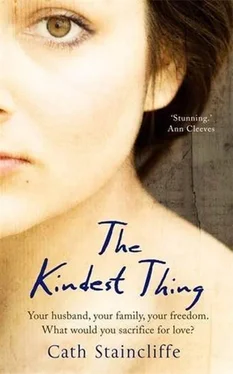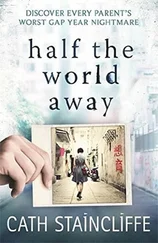After those first few days my father’s death was never mentioned. And talk of his life was strictly rationed. Now and again my mother would mention how he loved to sing or recall watching him play cricket when they were courting, and I would keep still and hold my breath and long for more, so afraid was I that I would forget him. But she would always snap out of any reverie and if I asked a question, tried to keep her talking, she would feign forgetfulness or ignorance. ‘I don’t know, I can’t remember. Now I must get on.’
One ill-judged day, at the age of twelve or so, I pulled out the photograph albums from the sideboard drawer. My mother was watching television. She saw me and tensed, straightening her spine against the sofa back and studying the magazine on her lap. I sat in the armchair and began to turn the pages, thick creamy vellum with black and white photographs carefully attached by corner mounts. This album ran from their marriage to our early childhood, and at the end the photographs were in colour: Martin and I in matching jumpers and tartan slacks, in romper suits on rugs, bundled up in woollen coats and tam o’ shanters feeding the ducks. Our clothes so formal, like little versions of our parents’, save the romper suits.
I turned the pages, longing for an invitation to share them with her but not daring to say anything. I was staring at a picture of my mother and father in evening dress. She looked vivacious, her lips dark with lipstick, her hair swept up in a chignon and her small figure stunning in a tulip gown. He gazed at her with great affection, his black suit and white shirt pristine. My mother laid her magazine aside and stood. ‘I’ll sort the ironing out,’ she said. ‘Turn that off, she nodded at the television, ‘when you’ve finished.’
With everyone out, I listened to the house settle around me. The lack of sleep took me back to the days when Adam and Sophie were small. The same aching muscles, dry eyes pained by the light, a spine filled with sand, emotions horribly close to the surface. As a new mother I would eat to try to maintain some energy, some equilibrium, but now I couldn’t. Instead I ran a bath and lay there until the water cooled.
Later, as I was hanging out the washing, I heard the doorbell.
A man and a woman are on the doorstep. For a moment I think they are selling windows or are Jehovah’s Witnesses – something to do with the suits they wear even in this heat. But they aren’t smiling. They flash ID cards at me and introduce themselves. All I hear is the word ‘police’.
‘Is it Adam?’ My heart bucks and my skin crawls with dread. ‘Oh, God, what’s happened?’
‘We’re not here about Adam. If we could come in?’ The policewoman flushes. I stand back, still swirling in the relief that Adam is okay, and they walk into the house. The ground tilts. I sense it then, a punch to the gut, the enormity of what’s coming.
‘We realize this is a very difficult time for you but there are a few things we need to clarify about the events leading up to your husband’s death. We’d like you to come with us to the police station. Is now a convenient time?’
My throat is dry. I don’t trust myself to speak. So I nod.
Like a zombie I put the answer-machine on, scrawl a note for Adam and Sophie, lock up the house and follow them out to the car. It is a plain vehicle, nothing to set the neighbours’ curtains twitching and saliva glands drooling. Shame. Pauline-next-door would like nothing better than to see me bundled into a panda car. The officers are very polite; they seem completely relaxed. I will answer everything evenly, carefully, I tell myself, and it will be fine.
At the police station I am taken to the custody suite. Like some pastiche of checking in at a hotel reception I give my name, address, date of birth. They ask me about any medical conditions I might have – mad with grief? I have to leave my bag with them. A young policewoman spreads out the contents and lists them. They ask for my earrings, my locket. They take my wedding ring. And then I have to sign the list. My hand trembles and my signature looks fake.
They explain that I can see a solicitor before I am interviewed under caution. Have I any questions? Numb, I shake my head. They request a DNA sample and run a small wand along the inside of my cheek. This is sealed in a container and notes made on the label. They take my photograph. Then my fingerprints. The ink smells strong, metallic, and then I am given medicated wipes to remove the dark, oily stains.
A man takes me through a locked doorway and along a corridor into a small cell. He smiles cheerily and locks me in. I sink on to the bench that runs across the back of the room. There is nothing else in the space. They took my ring. I bite my tongue. Where is Neil’s ring? In some sealed bag awaiting collection? What will they give me back? The clothes he died in won’t be fit for anything.
The walls of the cell press in on me. My skin is clammy and there isn’t enough air. I’m aware of my ribs locked too tight, my belly a fist of tension. I cup my hands over my nose and breathe out into my palms, eyes closed. I recall how I taught Adam to do this when paranoia made him hyperventilate, sitting beside him on his grungy bedroom floor, smoothing calm into my voice, talking him down. ‘Breathe out nice and slow, let it empty out. Now wait, two, three, four, five. Very gently, little sips, that’s it…’
His breathing was more regular, yet still when I tried to go to make us both a drink, he scrambled after me, eyes singing with panic, his fingers clawing at my sleeve. ‘They’re still there – they’re still out there!’
Oh, Adam. I felt like snapping at him, ‘They’re not out there, they’re in here, in you, and you’re not the only one they’re driving round the bloody bend.’ Instead I shushed and soothed and stayed with him until Neil came to do his stint.
In the police-station cell, as I wait, my sense of time distorts. I don’t know if it’s hours or minutes. I feel so alone and it is nothing like the solitude I usually revel in but that awful sense of being isolated, left and forgotten. ‘Left to rot’, that’s the phrase. They have locked me up and they will decide when I eat or sleep or pee, who I speak to.
The solicitor arrives. A black woman with a frazzled look as though she’s been dragged from her bed after an all-nighter. Might worry some people but I find it reassuring – the messy black curls, creased suit and purple shadows beneath the eyes give her humanity. She introduces herself as Ms Joy Gleason in a ripe Bolton accent, and even though I guess her to be ten or fifteen years younger than me, there is a practical, no-nonsense, maternal style to the way she deals with the situation.
She describes her role and asks me to tell her about Neil. I explain: his illness, the deterioration, the last morning, finding him dead; every so often she interrupts to clarify a point. She makes notes on a legal pad as she listens.
She frowns. ‘The police have no obligation at this stage to disclose any information or evidence they have so we don’t know what’s prompted them to interview you. It may be that the post-mortem on Neil was inconclusive or they’ve found it hard to attribute cause of death. But I’m second-guessing and, in a situation like this, where we really don’t know what they’ve got, then I strongly advise you to offer no comment.’
‘Won’t that make me look guilty of something?’
‘That’s what the police will tell you,’ she smoothes her hands over her hair, ‘because they don’t like it. But until we know where they’re going with this, I don’t want to put you in a position of having to respond to questions.’ She thinks for a moment. ‘They haven’t arrested you for anything but they do want an interview under caution. If you choose to answer their questions there’s no adequate preparation I can give you. They will want an account from you and they will test that account very rigorously. It will be produced in court, if things ever get to court. I would only ever encourage a client to answer questions in the dark like this if I was a hundred and ten per cent sure that the account was absolutely watertight and that the police evidence wouldn’t compromise it. But if I don’t know what they’ve got, whether it’s medical uncertainty or queries about the timing of events, whether there are suspicions of negligence or recklessness, then my advice has to be offer no comment.’
Читать дальше












